Positive attitudes towards migrant workers are greater in Singapore as compared to other Asian countries such as Japan, Malaysia and Thailand.
However, a significant percentage of Singaporeans still hold negative attitudes towards migrant workers, just as overall negative attitudes towards migrant workers have increased in the other three countries.
This is according to a joint study conducted by the International Labour Organisation (ILO) and United Nations Women that surveyed 4,099 nationals from the above four countries, including some 1,005 Singaporeans.
Launched to commemorate the International Migrants Day on Dec. 18, the study emphasises the need for more interaction and community engagement with migrant workers to counter exclusion, isolation, and discrimination.
More than half of Singaporeans are friends with migrant workers
According to latest estimates, the number of documented migrant workers in Southeast Asia and the Pacific is an estimated 11.6 million.
Statistics from the Ministry of Manpower show that there were around 1.4 million foreigners working in Singapore as of June 2019, including 255,800 domestic helpers and 284,300 construction workers on work permits.
Perhaps due to the increase in migrant workers over the last decade, a majority of Singaporeans feel that they have a positive impact on the national economy, as compared to only a minority percentage in the other three countries.
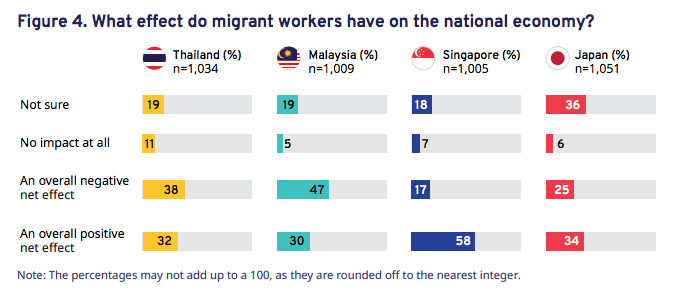 Image via ILO
Image via ILO
In addition, 56 per cent of Singaporean respondents said that they regularly interacted with migrant workers, compared to only 15 per cent in Japan and 43 per cent in Thailand.
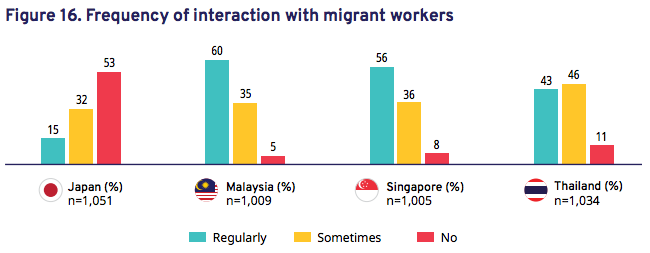 Image via ILO
Image via ILO
The percentage of Singaporeans who are friends with migrant workers (48 per cent) is also significantly higher than in the other three countries, especially in Japan and Thailand.
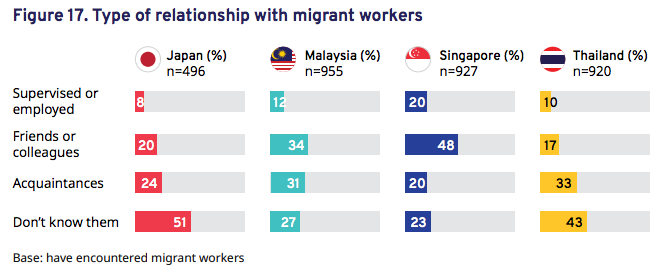 Image via ILO
Image via ILO
More than half of Singaporeans feel migration threatens country's culture and heritage, causes crime rates to go up
However, there also has been an increase in negative attitudes towards migrant workers in Singapore and the other three countries.
For instance, 53 per cent of survey respondents from Singapore perceive that migrant workers threaten their country’s culture and heritage, with 32 per cent believing that migrant workers have poor work ethic and cannot be trusted.
 Image via ILO
Image via ILO
In addition to this worrying statistic, 52 per cent of Singaporeans feel that migration have caused the crime rate to go up, as did 51 per cent of the respondents in Japan, 77 per cent in Thailand and 83 per cent in Malaysia.
However, an NGO staff from Singapore said there's no evidence of that: "There’s no proof to say that foreigners commit crimes. Mostly, they come here to work and not to get punished. As [migrants] are lower skilled, local people have bias towards them, so they think that migrant workers committed crimes."
Majority of Singaporeans feel that migrant workers should not have equal pay and benefits as locals
Some 60 per cent of Singaporeans also do not think that migrant workers should receive the same pay or work benefits as local workers, the highest reported percentage amongst all four countries.
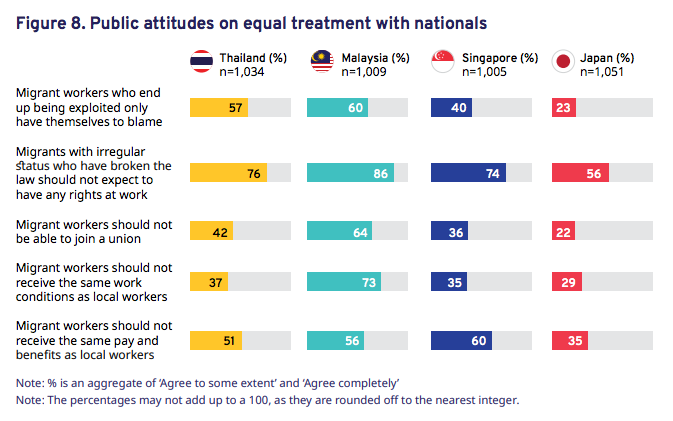 Image via ILO
Image via ILO
In addition, 42 per cent of Singaporeans do not support equal wages for locals and migrant women who are doing the same job, higher than percentage figures in Thailand (25 per cent) and Japan (17 per cent).
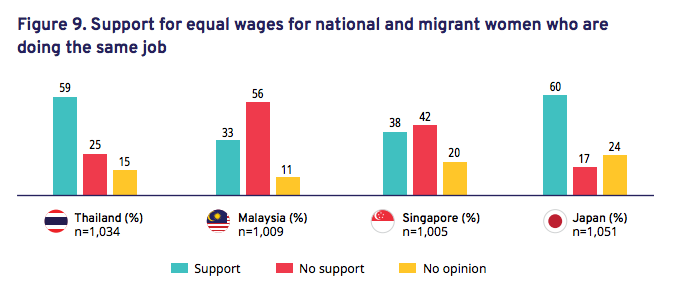 Image via ILO
Image via ILO
What Singapore can do to improve the situation
According to ILO, public support for migrant workers is mostly driven by the relationships and ties that individuals and communities develop with migrant worker communities.
People who know and engage with migrant workers on a personal level are more likely to be supportive of their rights, and to assist in times of crisis.
Collaborative efforts by governments, employer associations and civil society organisations that range from inclusive policy planning to awareness-raising activities need to be employed to reverse the negative trends observed.
In addition, the media can also start sharing information about migrant workers in a non-discriminatory way and report positive stories that humanise migrant workers and promote social cohesion.
Top image via Justin Lim on Unsplash
If you like what you read, follow us on Facebook, Instagram, Twitter and Telegram to get the latest updates.
